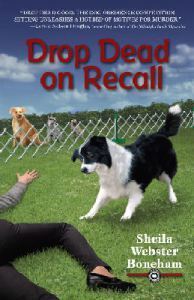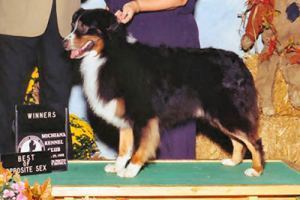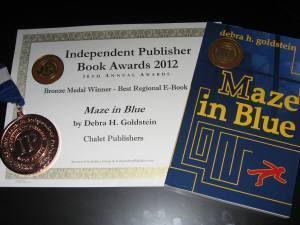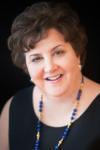Debra H. Goldstein's Blog, page 37
November 12, 2012
Guest Blog: Sheila Webster Boneham – Dog Hair and Mysteries
by Sheila Webster Boneham
A few days ago I popped into a local department store to look for a sweater. I found what I wanted, and headed for the check out. When I handed my credit card to the cashier, a rather prim older woman, I noticed the pained look on her face. Then she said, “There’s hair all over your shirt. What is that?” Granted, I was wearing a black pull-over and had cuddled my yellow Lab, Lily, earlier, but from the woman’s tone, you’d have thought I was spattered with blood!
I have killed people, but only in my books. Blood is not always involved. Hair (or technically in some cases) has always been a big part of my life, though, and it’s a big part of Drop Dead on Recall, my newly released Animals in Focus mystery. Not my hair, you understand (I’m barely interested in it anymore), but animal hair. Dog hair, cat hair, horse hair. My protagonist, Janet MacPhail, is a professional animal photographer, amateur dog-sport enthusiast and cat lover. She isn’t me, but we do have a lot in common. I’ve been active for more than two decades in canine activities, competitive and not – sort of a down-sizing of my younger days showing horses (hunters, jumpers, equitation). For me, as for Janet, animal activities are a hobby, although my professional life is also critter-centric. Janet takes pictures, and I write books (seventeen non-fiction books about dogs and cats and rescue), focused on animals.
At first glance it may seem that showing animals and writing are completely different sorts of pursuits, but they have more in common than you might think. I’ve considered the similarities in my passions before, but a few months ago I entertained myself as I languished in an airport after judging a dog show by jotting down a few parallels. Assuming that I’m a reasonably consistent human being (potentially a topic for another time), I figure that dog sports and writing must have elements in common to keep me so passionate about them for so many years.
The first element that comes to mind is aesthetic appeal. Beauty, yes – a well-turned phrase, a gorgeous head. But there’s more to aesthetic appeal than beauty. There’s rhythm, function, timing, and all the other things that come together to stir us to respond emotionally and intellectually to the thing before us. A dog may be beautiful in itself, or in its performance, or – ideally – in both, just as a piece of writing may be beautiful for its language and rhythm, or the way it moves us, or – ideally – both. That’s me, by the way, with my beautiful Reno at a show several years ago.
Then there’s the challenge of doing well in either arena. Training a dog to compete successfully is a lot of hard work for trainer and dog alike. Learning to write well is also a lot of hard work. This is, of course, true of anything we want to do well. To the casual observer of the finished product – the book, the competitive performance – it may appear to be no big deal. Trust me, it is. In fact, novices in both fields are often amazed to discover that they have to work, and work hard, if they want to make what they do look effortless.
 Of course, no matter how good you are, you don’t win every time. Editors say no thanks. Judges put you and your dog at the end of the line. Reviewers write bad reviews. Dogs and people trip and fall and make dopey mistakes. Rejection is part of both games, and rejection sucks. But here’s the thing…. the people who win a lot – with book contracts and in canine competitions – have also lost a lot. You just keep playing, and learning to play better, and eventually you win more often.
Of course, no matter how good you are, you don’t win every time. Editors say no thanks. Judges put you and your dog at the end of the line. Reviewers write bad reviews. Dogs and people trip and fall and make dopey mistakes. Rejection is part of both games, and rejection sucks. But here’s the thing…. the people who win a lot – with book contracts and in canine competitions – have also lost a lot. You just keep playing, and learning to play better, and eventually you win more often.
I thought of a few other parallels before we started boarding the plane, but the one that stood out – that has stood out for me for many years – is that I write and I show dogs because they’re both so darn much fun. In fact, despite the hard work and disappointments and frustrations that come with the territory, I’ve found some of my best friends through both writing and through my dogs. I’ve laughed until I cried, and cried without laughing, and I’ve experienced profound and moving and really silly moments. Janet MacPhail, the protagonist of Drop Dead on Recall, experiences similar joys and disappointments, albeit through photography rather than writing. And that’s not all we have in common. Janet’s Australian Shepherd Jay and her orange tabby Leo are nothing if not furry, and I suspect that Janet has horrified a cashier here and there, too, with her fur-spattered clothing.
Drop Dead on Recall is available in print and ebook formats through the usual sources. If you would like an autographed copy, please consider my Drop Dead for Healthy Dogs benefit event. Your purchase of a personally inscribed book will support canine health research and small business. Visit http://www.sheilaboneham.com/dropdeadforhealthydogs.html for information.
~ ~ ~ ~ ~ ~ ~ ~
When a top-ranked competitor keels over at a dog obedience trial, photographer Janet MacPhail is swept up in a maelstrom of suspicion, jealousy, cut-throat competition, death threats, pet-napping, and murder. She becomes a “person of interest” to the police, and apparently to major hunk Tom Saunders as well. As if murder and the threat of impending romance aren’t enough to drive her bonkers, Janet has to move her mother into a nursing home, and the old lady isn’t going quietly. Janet finds solace in her Australian Shepherd, Jay, her tabby cat, Leo, and her eccentric neighbor, Goldie Sunshine. Then two other “persons of interest” die, Jay’s life is threatened, Leo disappears, and Janet’s search for the truth threatens to leave her own life underdeveloped – for good.
~ ~ ~ ~ ~
Sheila Webster Boneham is the award-winning author of 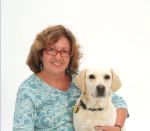 Drop Dead on Recall, the first book in the Animals in Focus mystery series, and seventeen nonfiction books about animals, including the highly regarded Rescue Matters! How to Find, Foster, and Rehome Companion Animals. Sheila earned her doctorate in folklore from Indiana University and has taught writing at universities in the U.S. and abroad. Knowing there’s always more to learn, she is currently completing a Master of Fine Arts in Creative Writing in the Stonecoast MFA Program at the University of Southern Maine.
Drop Dead on Recall, the first book in the Animals in Focus mystery series, and seventeen nonfiction books about animals, including the highly regarded Rescue Matters! How to Find, Foster, and Rehome Companion Animals. Sheila earned her doctorate in folklore from Indiana University and has taught writing at universities in the U.S. and abroad. Knowing there’s always more to learn, she is currently completing a Master of Fine Arts in Creative Writing in the Stonecoast MFA Program at the University of Southern Maine.
Sheila has been deeply involved with animals most of her life and is a strong advocate for both responsible rescue and responsible breeding. In the past two decades, she has trained and competed with her own dogs in several sports; bred highly successful Australian Shepherds under the kennel name “Perennial”; organized rescue organizations and fostered dogs; trained, handled, and assessed therapy dogs; judged dog shows. She has also given millions of belly rubs and flicked countless dog and cat hairs off her clothes!
Sheila would love to hear from you. You can follow her news and events or contact her at the following places: Facebook at http://www.facebook.com/sheilawrites Twitter at http://www.twitter.com/sheilaboneham or @sheilaboneham Website at http://www.sheilaboneham.com Amazon at http://www.amazon.com/author/sheilaboneham


November 5, 2012
The Next Big Thing
The Next Big Thing by Debra H. Goldstein
A few weeks ago, author Linda Rodriguez, whose book Every Last Secret won the 2011 St. Martin’s Malice Domestic Best First Traditional Mystery Novel Competition, invited me to participate in The Next Big Thing. The Next Big Thing is a tag blog post idea from She Writes that is intended to help female writers promote their works in progress by answering ten questions about their WIP. The blogger then tags a group of other female writers for next week. I’ll be talking about my present WIP (that two agents just requested to read), but for now, although it isn’t a work in progress, I heartily recommend reading Linda’s Every Last Secret and visiting her website, www.LindaRodriguezWrites.Blogspot.com .
Interview Questions for the Next Big Thing
What is your working title of your book? The working title is JavaTime, but I need to come up with a catchy three word title that the Candi Martin series can be built around. Quirky, perhaps dealing with a female sleuth, maj jongg, citizens who range from 6 to 86, corporate intrigue, the law…….good ideas are being sought????
Where did the idea come from for the book? Candi Martin washed out of the police academy and is a young corporate attorney … I have a writer friend who once was a police officer and prior to becoming a judge, I was a litigator. As a child, my mother always played maj jongg and as she has aged and I have observed the changes in her friends and her in terms of self-censorship and interacting with others, I couldn’t help juxtaposing their traits and abilities into a fictional work that also features children and grandchildren who are young enough to know it all.
What genre does your book fall under? JavaTime is a mystery. It will appeal to readers who enjoy cozy mysteries, female sleuths, and geezerlit, and, most of all, people who enjoy a fun read.
What actors would you choose to play your characters in a movie rendition? This is such a hard one!!!!!! Candi is young, strong, vulnerable, bright, and has flaming red hair (perhaps Dallas Howard? Or better yet an unknown?) The two men who come through her life have Irish jet black hair looks and nebbishy Jewish looks…..the latter could well be played by Ben Stiller while the first?…I leave to your imagination. The maj jongg group screams for Betty White, Debbie Reynolds, France Sternhagen, Angela Lansbury and others we have grown to love for their wit, humor, grace, and style.
What is the one sentence synopsis of your book? Okay…it is two sentences: Police academy washout and junior corporate attorney Candi Martin must add murder-solver to balancing her legal career and regular visits to her father, who is slipping deeper into dementia at the Sunshine Village Retirement Home in Wahoo, Alabama after her estranged mother reappears, but is found a few hours later at the retirement home stabbed to death wearing another woman’s clothing. Her parents’ secrets, corporate intrigue, interference from the Sunshine Village maj jongg game and leftover feelings for the detective assigned to her mother’s case complicate her efforts.
Will your book be self-published or represented by an agency? An agency, I hope.
How long did it take you to write the first draft of your manuscript? About six months.
Who or what inspired you to write this book? After my publisher for Maze in Blue, my 2012 IPPY award winning murder mystery set on the University of Michigan’s campus, ceased operations, agents told me they would like to see a new series. I had written a short story, “Legal Magic,” (www.alalit.com 2011) that had a male protagonist and some great retirement home characters who played maj jongg and I was working on a story about a female sleuth, who had become a lawyer after deciding the police academy wasn’t right for her, and all of a sudden, it seemed like they belonged together. Some writers say their characters talk to them, and in this case, they invaded my sleep and my waking hours until I brought them together on the page. Now, they are drumming a sequel into my brain!
What else about your book might pique the reader’s interest? Besides being an enjoyable read, my still to be named work in progress mixes a good plot, fun characters, and issues readers will identify with.
Next week, watch for blogs from:
T.K. Thorne — www.tkthorne.com
Gail Handler — writefromthesoulvisualeyes.blogspot.com/
Karen Cunningham – karencunningham619.wordpress.com


October 8, 2012
Guest Blog: T.K. Thorne – How Do You Know If You Are A “Real” Writer?

T.K. Thorne – Author of Noah’s Wife – “2009 Book of the Year for Historical Fiction – ForeWord Reviews
How Do You Know if You Are A “Real Writer? by T.K. Thorne
HOW DO YOU KNOW IF YOU ARE A “REAL” WRITER? This question has plagued me for a long time, and I saw it recently on a writing web site, so I am not the only one who has asked it. For a long time, I was unpublished and wrote in the “closet.” I was afraid if I admitted to doing it (writing, folks) I would have to face that dreaded question: “Oh, what have you published?” To which, I’d have to say, “Well, nothing… but my mother loves my stuff.” And then go crawl under a rock.
I’m sure there are people out there for whom this would not be a problem, people who have lots of self-confidence and don’t care what anyone thinks of them. I tip my hat to you. For the rest of us, what to do? Should we go to the writer’s conference and expose ourselves as wanna-be’s or should we just stay home?
Now that I have a novel published, I have the perspective to return to this perplexing question. How do you know when you are a “real” writer? What is one? Does anyone who picks up a pen or taps on the computer qualify? Do you have to be published? How many times? Does self-publishing count? Does payment in art journal copies qualify or do you have to be paid for it? If you win an award or get an honorable mention, does that jump you to the “writer status?” According to the IRS, a professional is anyone who is paid for their work. My first publication to a magazine netted me $8.48. It was a great feeling to finally reach that milestone, but somehow it didn’t make the question go away.
Is the aspired distinction merely to be found in the eye of the beholder? If I like what you write, does that make you a “writer” in my eyes, but if I don’t care for it, you aren’t? Saying someone is a “good writer” or a “bad writer,” at least slaps the tag on them, but is he/she a “real” writer? If you keep a journal under the bed and scribe in it daily, are you one or not?
Okay, I’ve asked the question, now I’ll share my epiphany. By college, I was quietly writing fiction, but I took a class in poetry because my roommate talked me into it. It turned out to be the best move I could have made. Everyone brought their hearts and souls to class with their poems. And it was brutal. I learned that there was only one rule—Does it work?
Not, does it express what you really want to say? Not, does it use alliteration and rhyme correctly? Only, does it work? You can break rules; you can follow rules; you can cry big crocodile tears onto your paper, but the only question is that one.
So, it doesn’t matter if you are published or not, have won awards or not. It doesn’t matter what you write or how often you write. It doesn’t matter. A writer wants it to work! If it doesn’t work, a writer is willing to produce it for critique, to listen to criticism, to cut, to add, to change, to ask questions, to learn, to rewrite, to stand his/her ground, to start over, to rewrite again—whatever it takes to make it work.
Of course, you can write without being “a writer.” And there is nothing wrong with writing for your own pleasure or self discovery or for your mother. Kudos to you and keep writing! But if you have a passion to tell a story, to paint in words, to reach people, to move people, then you understand the question—Am I a “real writer?” And if you have that passion and are willing to work to make it “work,” then, in my book, you is one!
~ ~ ~ ~ ~
T.K. Thorne retired as a captain of the Birmingham Police Department and currently serves as executive director of CAP, a business improvement district in downtown Birmingham. Both careers have provided fodder for her writing. Her fiction, poetry, and non-fiction have been published in various venues and garnered several awards, including “Book of the Year for Historical Fiction” (ForeWord Reviews 2009) for her debut novel Noah’s Wife. A short film from her screenplay Six Blocks Wide was a finalist in a film festival in Italy and has shown at other juried festivals in the U.S. and Europe. She has served on several community boards, including the Alabama Writer’s Conclave. She writes on a mountain top east of Birmingham, Alabama. To learn more about T.K. Thorne and her writings check out her website at www.tkthorne.com .


September 23, 2012
My Daughter Is In Love – Debra H. Goldstein
DHG Comment: My daughter got engaged August 30, 2012. She normally is a very private person. The piece below was written almost three years ago after we hung up from a telephone conversation during which she first told me she was seeing Kevin exclusively. I hope it brings back memories for you, too ….
MY DAUGHTER IS IN LOVE -
Tonight, my daughter called to tell me she is dating someone special. My daughter is in love. You should have heard the lilt in her voice. She was asking my approval, but at the same time she was telling me that while it mattered, it didn’t. She is seeing Kevin. No question about it.
So many times we post about our fears; but, this time, I have fears that are good ones. I’m scared whether she has picked the right boy. I’m petrified that he’ll not love her enough or that he will love her too much. I’m frightened that she will give up her dreams to bend to his wishes. I’m afraid that she will place career or other distractions ahead of her heart.
No matter how much I may worry, tonight my daughter is in love. Even though we only spoke on the telephone, I know her eyes were shining and she was grinning that little crooked smile that she only allows to show on special occasions. Nobody else’s thoughts mattered tonight…my daughter is in love.
She told me that she feels silly because she feels good when Kevin calls her or when he walks into the room she is in. When he strokes her hair or takes her hand, she tingles. She actually used that word and then laughed because my daughter is not a tingly person. My daughter is analytical. She approaches the world carefully using her mind and senses to evaluate and make determinations. Tonight, she giggles and literally says her intellect says one thing, but her gut says something else. My daughter has been in the process of making a career change that probably will mean moving to another state, but tonight she isn’t sure how to balance what she knows would be a smart move in terms of her career against how she feels emotionally. For the first time in her life, my daughter is making a decision based purely upon the feeling you get the first time you go into an ice cream store and can pick any flavor you want. It will be a decision that hopefully reflects the peaceful sensation that comes from seeing a rainbow. My daughter is in love.
I’ve been married so long that I don’t think of my husband with giddiness. He is the guy who drops his socks next to the bed. He falls asleep on the couch for two to three hours every night watching CNN or a ballgame and then tells me that he can’t sleep. Until tonight, I forgot how much I once enjoyed his phone calls checking on me during the day. Now, his calls often seem like annoying distractions when I’m working. We share meals and conversation, but we have fallen into a pattern that might be called routine or even a bit boring.
My husband also is the daddy who would do anything to make his little girl laugh whenever her world seemed to be crashing. With shaking clumsy hands, he tenderly bathed and fed her, tried to fix the bow snapped into her wisps of hair and taught her to bat a ball. He would give his life for her. Tonight, he is the father of a daughter who is in love and that colors my love for him.
My daughter is in love.
~ ~ ~ ~ ~
Debra H. Goldstein received a 2012 IPPY Award for her debut mystery, Maze in Blue. She has won awards for both her short stories and her non-fiction pieces. Most recently, in August 2012, her short stories ”Meme’s Place” (It Was a Dark and Stormy Night – anthology published August 2012) and “Grandma’s Garden,” www.Alalit.com (2012) and a legal piece, “Practicing Social Security Law – The Best Kept Secret,” Birmingham Bar Association Bulletin, p. 26-29 (Fall 2012) [w/Jennifer Goldstein] were published.


September 9, 2012
Guest Blog: Author Judy Hogan’s Conversation with Sammie Hargrave – Her Favorite Character
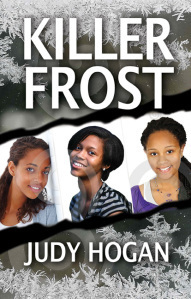 Author Judy Hogan’s Conversation with Sammie Hargrave – Her Favorite Character
Author Judy Hogan’s Conversation with Sammie Hargrave – Her Favorite Character
Judy Hogan: Sammie, a new writer friend of mine, Debra Goldstein, wants a blog from me to post on her blog in early September, to celebrate the publication of Killer Frost, and she suggested I interview one of my characters. I picked you, who are my favorite.
Sammie Hargrave: Suits me. What do you want to know? Seems like you should know me pretty well, after writing eight books in which I play Penny Weaver’s sidekick.
Judy: That’s the thing, Sammie. You always surprise me. You’re my most unpredictable character.
Sammie: Otherwise, your novels would be dull. Penny’s okay. I’m fond of her. But without me to liven things up, she might be a little boring. She’s so earnest. I mean, she tries hard to obey the rules. It only works for her about half the time, but she hasn’t caught on yet.
Judy: We can’t say the same about you, Sammie. You’re a consummate rule-bender and dodger.
Sammie: I have more fun, plus Penny never minds when we’re solving a case, and I get into Derek’s briefcase to see the autopsy results, or we conduct our own interviews when he’s told us to say out of police “bidness.” He’s worse than Penny is for rules. It’s women who generally figure things out. We see the big picture and pick up the atmosphere around people–the aura, stuff like that. I can read body language a hell of a lot faster than Penny can, girl, or Derek, for that matter, but at least Penny’s learning to trust her gut instincts and know she needs me. Can’t you see that?
Judy: I’m beginning to. I myself was raised in a minister’s family, raised to be a good girl. But by twenty-one I was in full rebellion, and I was drawn to people who had a touch of wickedness. Maybe especially it was flamboyance I liked, and straight talkers. I was sick of being nice to everyone. I suffered for it. Some of the rebels I hooked myself up with hurt me, betrayed me, you name it. Finally, I added a little bit of wickedness to my own character–balanced it.
Sammie: Ha, girl. You don’t know from Adam about no wickedness. You and Penny, who’s your alter ego–right?–are still 99% good girls. But you did get tougher, saw other people better, developed your bullshit detector, but the way we start out, stays. You never noticed?
Judy: Tell us how you started out, Sammie.
Sammie: I was raised right here in Shagbark County, central North Carolina, and my people, too, as far back as I know. Folks had plantations here, going back into the 1700s. Ships came up the Cape Fear River, which our Haw flows into. There were land grants from the King long before the Revolutionary War. I haven’t traced back past my grandmother’s people, who were slaves. She died when I was little, but Mama told me how it was.
I identify with my African beginnings, my slave ancestors, my grandmother, who grew up before World War II and did the white folks’ laundry, carrying it all from the big house to her shotgun tenant shack, and then washing it all by hand, ironing it with an iron heated on the woodstove, and then carrying it all back. Then my mother worked as a maid for rich white folks and my father did logging work until he died. She got me into an integrated school as soon as they had one in Shagbark–1972–when I started kindergarten. She saved pennies for my books and clothes, and later, for my college. I owe her so much. Yes, that much of my history I know. I have a love-hate relationship to it. So much cruelty and injustice, but I’m so proud of the strength and courage my ancestors had.
It’s why I teach at St. Francis, shitty as it sometimes gets. I want us black folks to hold onto our culture, our churches, our literature, our music, and our language, and, of course, our history. Without our language, our culture dies. So I keep it current in my mind, and I encourage my students to do that but to distinguish between when to use standard English and when to talk black folks talk.
Judy: Your friendship with Penny is so important to her, Sammie. I like to think the two of you work on healing the rift that stays between the black and white races in this country.
Sammie: Right, important to me, too. Penny is good people, even if I have to educate her half the time. Things have changed a lot, but you know how that racism sticks. I sometimes think we’ll never be free of it until people can’t tell the difference between us and everybody else–especially by skin color.
Judy: Tell me more about what’s important to you, Sammie.
Sammie: Like you, I want to be my own self, and I got this thing about clothes and hair. Hats, too. I like to look good, and I know people judge a lot by how you look. That’s where Penny and I differ. She dresses about the same way every day and rarely wears a dress.
Judy: Penny has two dresses. I own three. But we save them for special occasions–weddings, fancy banquets.
Sammie: So Penny wears jeans and slacks, blouses and shirts; shorts in the summer. See her in a dress? Must mean somethin’ big is comin’ down. But I like to dress up. Always did. Mama let me play in her old clothes and Grandma’s wigs. I’m a Thrift Store addict, and I have friends and cousins I trade off with. I like it when people notice me. I like it even better when they don’t recognize me because I look different from the last time they saw me.
But a lot of white people? They don’t see us nohow. Like we’re invisible. Run into them in a store, someone you’ve met at some political meeting? They don’t see you. So I take it one more step. They notice but they don’t realize they’ve seen me before. I can’t say why I do it. The devil in me, I guess.
Judy: I know I enjoy you, Sammie. You add zest to my writing. A lot of my characters started from people I know. Like Marcel Proust did, I often blend two or three together. But you came to me out of the blue except for one detail. I had an African American friend who also liked to look different each time you saw her. That’s all I had to start with, and now you live and breathe, and I love to see what you’ll do or say next. It’s one of the rewards of writing fiction.
Sammie: I’m glad I’m your favorite. It’s not hard to surprise you, Judy. You’re so predictable.
~ ~ ~ ~ ~ ~
Judy Hogan’s first mystery novel, Killer Frost, was published September 1, 2012, 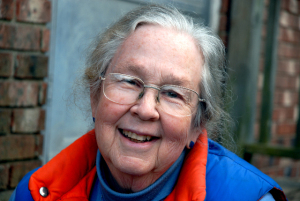 by Mainly Murder Press of Connecticut. Judy founded Carolina Wren Press (1976-91), and was co-editor of Hyperion Poetry Journal (1970-81). She has published five volumes of poetry and two prose works with small presses. She has taught all forms of creative writing since 1974. She joined Sisters in Crime and the Guppies in 2007 and has focused since then on writing and publishing traditional mystery novels. In 2011 she was a finalist in the St. Martin’s Malice Domestic Mystery contest. The twists and turns of her life’s path over the years have given her plenty to write about. She is also a small farmer and lives in Moncure, N.C.
by Mainly Murder Press of Connecticut. Judy founded Carolina Wren Press (1976-91), and was co-editor of Hyperion Poetry Journal (1970-81). She has published five volumes of poetry and two prose works with small presses. She has taught all forms of creative writing since 1974. She joined Sisters in Crime and the Guppies in 2007 and has focused since then on writing and publishing traditional mystery novels. In 2011 she was a finalist in the St. Martin’s Malice Domestic Mystery contest. The twists and turns of her life’s path over the years have given her plenty to write about. She is also a small farmer and lives in Moncure, N.C.


August 19, 2012
Baseball and Writing: What I learned from the Atlanta Braves
Baseball and Writing: What I learned from the Atlanta Braves
by Debra H. Goldstein
The Atlanta Braves are in the run for the pennant – or so I’m told. The team I saw play last night lost, justifiably, because of an abundance of errors, pitching that didn’t find its mark except to give up home runs and, other than Freeman’s great stop and pitch from his knees to first, lackluster play. The Braves beat the Dodgers in overtime on Friday. My writing often is like the Braves-Dodgers’ series.
It takes time for me to get warmed up. I turn on my computer and open a blank page. Sometimes, I review my stats by reading back what I previously wrote or checking how well my book, Maze in Blue, is doing on Amazon. Other times, I take a few warm-up pitches by checking out Facebook, Twitter, e-mails from friends, or playing a few games of spider solitaire. When I think I’m ready, I go back to the blank page I minimized. It’s still there.
Like a pitcher looking to the catcher for the signal, I wait for a message from on high to flow through my body onto the paper. Just when I think I’ve got it, the batter steps out of the box and I have to gear up again. Occasionally, frustrated, I opt to try to pick off the player on first by editing something I already wrote; but, more times than not, the runner gets back to base safely. That leaves me torn between trying the same move with another piece of my writing or throwing a fastball at the batter.
I like fastballs because they represent the time when my writing is at its best. It flows and I’m in the zone – unless I give up a home run like the Braves pitcher did three times in a row last night. Then, all I can do is watch the ball fly over the fence as the runner rounds the bases. I know I have no choice except to start over. If I dwell on the past or lose my nerve, I won’t be able to give my fans or the team supporting me the best effort they deserve.
Occasionally, the catcher or the coach gives me a pep talk or critiques my pitching. I can’t always translate the critique at the moment, but eventually I get the message and my writing is the better for it.
More often than not, my writing reflects the Braves game I saw last night, but every now and then I write something that gives me the feeling I should be up for a Cy Young Award. That feeling is what it’s all about.
~ ~ ~ ~ ~
Although when it comes to writing, “It’s Not Always A Mystery,” sports is a different matter. I love books and theater….my husband adores any sport and any team (though before anything else, his blood runs crimson). The balance of our interests makes for a successful mixed marriage. Perhaps this will be the topic of another Debra H. Goldstein blog. In the meantime, let me know your thoughts on writing as compared to sports and your own personal interaction with sports. DHG
August 7, 2012
Guest Blog: Robert Spiller’s Thoughts on the Waldo Canyon Fire

Author Robert Spiller
A Writer’s Thoughts on the Waldo Canyon Fire
by Robert Spiller
For those of you who have wondered how it was in Colorado Springs during the Waldo Canyon Fire, here are the facts: A fire storm raged out of Waldo Canyon, was fed by mindless winds, spread at an insane speed across my beautiful Rocky Mountains, was fought by men and women of valor, displaced over thirty thousand people, consumed over eighteen thousand acres, and devoured over three hundred homes.
Again these are the facts. But the stories are so much more.
MY FRIEND
This morning I went with some friends from Pikes Peak Writers, a local writer’s organization, to deliver about three vans worth of stuff (food, furniture, computer equipment, and just general necessities) to a friend who lost her home to the fire. I’m still trying to wrap my mind around waking up one morning and realizing your home is gone…forever. The recipient was a fellow writer who has never failed to impress me, not just with her skill as a writer, but as person of integrity and strength. I had seen her a few days earlier to deliver a care package (some wine, cheese, crackers, and strawberries). She was in shock at that time. She had lost her beloved home, and although a dear, dear friend had taken her in, she would never be returning to the ten million things that were lost. This morning, she looked exhausted, but had gained some composure. Understandably, she was sad, but she spoke of recovery and how her children were taking the adjustment (this is what we call other people’s reaction to tragedy). I can only wonder if I would have been as strong had my home been devoured by an inferno.
THE WELCOME
The president of Pikes Peak Writers is a soft spoken, gracious woman. She works tirelessly for the organization that puts on the Pikes Peak Writers Conference—in my estimation one of the best writer’s conferences in the world (I might be biased). Between June 23 and June 25 some 32,000 folks were displaced from their homes. Entire sections of Colorado Springs were depopulated. Many of these people ended up in school gymnasiums, shelters, and other giant structures where legions of cots were brought in to house the homeless. This woman, my friend, opened her heart and her home not just to a family in need but to three families. These displaced individuals became part of her family for the better part of a week. What was even more amazing is that she did all of this with gratitude in her heart. She felt it was not only her civic duty but her privilege to make her home available to those in need. This scene was replicated again and again across Colorado Springs by folks who saw a need and answered a call. It’s at times like these that I am most proud of my species.
THE DEATHS – THE MORNING OF JUNE 26
This morning I read that a person (not a body, this is no cozy mystery to be read then forgotten) was found dead in a fire-ravaged home in the north end of Colorado Springs. I didn’t know this person in any way, shape, or form. He or she was just fellow Coloradoan who shared my home town and died in a horrific natural disaster. My heart broke and I wept.
THE PARADE
Over 2000 firefighters were brought in from all over the country to fight a fire that for a number of days was almost alive with a voracious appetite. Sixty-five mile an hour winds fed the blaze. With a super-human effort, these brave men and women worked around the clock, many refusing to leave the front lines until their supervisors forced them to do so. Even though many homes were lost, thousands were saved by their valor. As the days passed, it became apparent that these firefighters, many of whom were from outside of Colorado, were true super-heroes worthy of our admiration and so much more. A makeshift village of hundreds of tents was erected in a large field along I-25 in northern Colorado Springs. Several times a day, as the firefighters changed shifts, a fleet of school-buses would carry firefighters to the ravenous blaze and then bring to the village weary soot-covered firefighters. The buses took the same route every day, and before long an army of well-wishers lined the route with signs bearing messages of love and gratitude. One day, after a particularly exhausting shift of placing their bodies in the path of destruction, the firefighters in their buses were winding their way back to the camp. The shouts went up. The signs were waved. Tears of gratitude were shed. Then a grimy hand extended out an open bus window and a thumbs up was flashed, then another and another. Then the buses were gone, but not the feeling that something magic had just transpired.
Waldo Canyon contains a seven mile hike through some of the most beautiful landscape on the planet. I have hiked it more times than I can count, most notably on the day before my wedding. The hike wanders along breathtaking views, clear mountain streams, and stands of aspen and columbines. There have been times when I’ve passed folks coming out of the canyon as I was going in. The smiles on their faces told a tale of a communion of with nature that words would fail to convey…smiles would have to do. Most of the canyon has now been laid low by the ravages of a mindless fire and the hike itself is closed for the indefinite future. But I believe that the Earth abides. The land will heal itself. One day the canyon will be open again to the smilers. Hopefully, this time we’ll be more careful.
~ ~ ~ ~ ~
Robert Spiller is the author of the Bonnie Pinkwater mystery series: The Witch of Agnesi, A Calculated Demise, Irrational Numbers, Radical Equations. His math teacher/sleuth uses Mathematics and her knowledge of historic mathematicians to solve murders in the small Colorado town of East Plains. Robert is working on the fifth Bonnie book, Napier’s Bones. Robert lives in Colorado Springs, CO with his wonderful wife Barbara. His three children and four grandchildren all live within shouting distance. After thirty five years in the classroom, Robert retired from teaching mathematics this year to write full time.


July 29, 2012
Going for the Gold – DHG’s Top Three Medals for a Writer
Going for the Gold – Top Three Medals for Writers
This is the week of the Olympics. Most of us will be glued to our televisions from the Opening to Closing ceremonies. Some will hold our breath while gymnasts fling themselves into the air from the high bars or twist and turn on pommel horses. Others will agonize whether this is the year of Ryan Lochte or if Michael Phelps will win the three medals he needs to be the most medaled Olympiad. Whatever the outcome of the games, the events and awards will, unlike being a writer, happen during a finite period of time. Because a writer’s life is continuous and is not televised, even though every writer dreams of winning a gold medal, here in reverse order are my top three Olympic Medals for Writers.
Bronze: The bronze medal is given today for the act of training. Olympic athletes set practice schedules and repeat and repeat moves until perfected. A writer trains by coming up with an idea and then getting it down on paper. Talking about it won’t win a medal. Rather, a writer must set a schedule and adhere to it to produce a number of pages or words. The first draft is a start, but revision and revision is necessary to be considered for this medal. Good intentions about exercising or writing are not sufficient. So, congratulations to Bronze Medalist: Training/Getting it Down on Paper.
Silver: Once a story, poem, or book is finished, it needs to find readership. The silver medalist faces rejection, criticism and praise while seeking an agent, editor, publisher, or self-published outlet. Qualification for this medal may include rewriting that slashes well-loved pages and scenes. Congratulations to Silver Medalist: Getting Published.
Gold: The line between Getting Published and Promoting While Continuing to Write is very close, but the difficulty of balancing the time period of seeking to reach an expanded readership after publication while still finding time to write is the winner. The gold medal reflects time management, going outside one’s comfort zone, being flexible, and finding a way to blend creativity with further accomplishment. Congratulations to Gold Medalist: Promoting While Continuing to Write.


July 15, 2012
Guest Blog: What Makes A Good Writer’s Group by Linda Rodriguez
What Makes A Good Writer’s Group by Linda Rodriguez 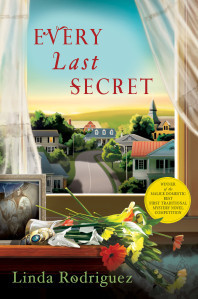 author of Every Last Secret – winner of the (St. Martin’s) Malice Domestic Best First Traditional Mystery Novel Competition
author of Every Last Secret – winner of the (St. Martin’s) Malice Domestic Best First Traditional Mystery Novel Competition
Over the years, I have been a part of many writer’s workshops, groups, and organizations. I have been a founder of several. When I was a young wife and mother, I desperately wanted the companionship of other writers, other people who understood this difficult thing I was trying to do.
Since those days, I have developed many wonderful writer friends who truly understand this difficult thing I still try to do. Better yet, I am now married to a writer-editor and have a son and foster-son who are talented writers. I also belong to four writer’s organizations that I helped found—The Writers Place, Latino Writers Collective, Border Crimes, and The Novel Group—three that I had no part in developing but still love and support—the Macondo Writing Workshop, Wordcraft Circle of Native American Writers and Storytellers, and Con Tinta.
Before these groups, there others that were not so helpful or successful, a series of undergraduate and graduate writing workshops, a group of activist writers putting out an underground newspaper (back in the day of underground newspapers), a short-fiction critique group, a freelance writers group, a novel critique group, and even a romance writers group. So I have broad experience with writer’s organizations and groups.
One of the key elements of a good writer’s group, whether it is nationwide like the Macondo Writing Workshop, citywide like The Writers Place, or just a few writer friends like The Novel Group, is respect, respect for the group, for the other members and for the purpose of the group. Respect involves giving honest and helpful criticism without making it hurtful or personal. Respect involves valuing the distinctive differences of each member, as both a writer and as a person, appreciating what those unique qualities bring to the group as a whole.
Another hallmark of a good writer’s group is enthusiasm. Good groups are excited about writing and the writer’s life. When members grow discouraged, they can come away from a meeting of their group re-energized and back in touch with their passion for writing.
If a writer’s group or a subset of the group functions as a critique group, it is important for all the writers in the group to be writing at a similar level of experience and ability, otherwise the group will eventually fail as a critique group, no matter how congenial the individuals are. Often, however, beginners may be a part of a group led by an experienced author for a fee. This can be a good foundation—if the goal of both the leader and the members is for the members to outgrow the group.
What has your experience of writers groups been? If you have not been able to find one, would you consider starting one of your own?
~ ~ ~ ~

Linda Rodriguez
Linda Rodriguez’s novel, Every Last Secret (Minotaur Books), won the Malice Domestic Best First Traditional Mystery Novel Competition, was selected by Las Comadres Conversations With…, and was a Barnes & Noble mystery pick. The second book in the Skeet Bannion series, Every Broken Trust, will be published in Spring 2013. Linda reads and writes everything, even award-winning books of poetry and a cookbook, and she spends too much time on Twitter as @rodriguez_linda. She blogs about writers, writing, and the absurdities of everyday life at http://lindarodriguezwrites.blogspot.com.


June 30, 2012
Good-bye Nora Ephron
by Debra H. Goldstein
I never met Nora Ephron. Unlike the beautiful tribute Liz Smith wrote about her, I can’t say I personally experienced her wit, humor or cooking. But, I feel that Nora Ephron intimately knew me.
Essays like “I Feel Bad About My Neck,” “On Maintenance,” and “I Remember Nothing” capture the feelings and emotions I feel as I hide my once toned arms under sleeves and jackets and quietly discuss with my friends whether plastic surgery really can make us look “gently refreshed.”
Because of our ages, my friends and I find pieces by Anna Quindlen and Kelly Corrigan mirroring exactly what we are going through. We find comfort or at least familiarity in their words as our parents become our children, our children become the stars we once were, or we find ourselves having to take our parents, children or both into our homes until they regain their footing. Being a decade or two older, Nora Ephron’s works take us beyond our present experiences – and are there to comfort those of us who unfortunately have been precocious.
A few years ago, when my dear friend, Judy, was facing terminal cancer, I wrote about my anguish at having become my mother and my helplessness in knowing what to say or do for Judy in “Maybe I Should Hug You.” A year later, reading Ephron’s “Considering the Alternative,” a chill ran up my spine when I read the words about everything being fine one day, her friend Judy finding a lump on her tongue and being dead from cancer within a year, and having to move forward knowing the big “D” is out there.
It was at this point in time that I explored more of Ephron’s works. I laughed at the truths she incorporated into her ostensibly light romantic comedies like “When Harry Met Sally,” “Sleepless in Seattle,” and “You’ve Got Mail.” After reading Heartburn, I wondered what she could have done with the Bobbitt case, but then realized it would have lacked the personal quirky tie-ins that she managed to include even in remakes of movies or story ideas.
Nora Ephron managed to express my inner thoughts with a clarity I didn’t know existed. Through words and scenes, she reached into my soul and said the things I only whisper to my husband or dearest friends. Her death at merely 71 silences a voice that I looked forward to following for a long time.
It is our loss that we won’t know what else she knew about us, but in going forward, at least for me, I’ll look back at the body of work she left behind, paraphrasing one of my favorite Nora Ephron lines: “I’ll have what she’s having.”









